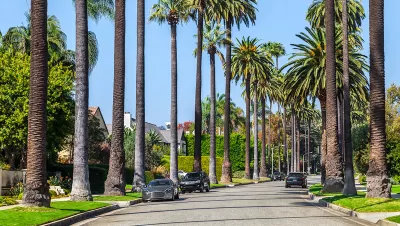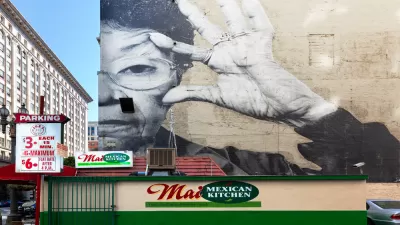Councilmember José Huizar weighs the city's new rules against those proposed by the upcoming ballot measure.

Los Angeles Councilmember José Huizar, who chairs the Planning and Land Use Committee, is behind the city's new framework to update its 35 community plans every six years. In The Planning Report, he explains how the move was spurred by the fierce debate over the upcoming Measure S, and how the city's reform program—although it has not yet secured a source of funding—serves to "rebuke" the points behind the March 7 ballot measure.
While taking up a central premise of the measure—that the city's general and community plans must be updated—Huizar believes the proposal's temporary moratorium on plan exemptions would be detrimental to economic development and job creation.
"The good thing about Measure S is that it brought light to the city’s need to update its community plans ... The bad thing about Measure S is the two-year moratorium. Not only will it slow down development and growth in our Downtown area, but it will not allow us to manage that growth over two years. Passing Measure S will bring more chaos to the system it wants to fix."
Huizar also describes the "astronomical" growth of investment in Downtown, which is part of his district, and his plans to make the area friendlier to families, pedestrians, and the entertainment industry.
Downtown’s own community plan is being updated right now; the DTLA2040 Community Plan Update is coupled with the pilot of recode.LA, the effort to update and simplify the zoning code citywide.
FULL STORY: José Huizar On Downtown Building & City Council Vote To Reform Planning In Shadow Of Measure S Vote

Planetizen Federal Action Tracker
A weekly monitor of how Trump’s orders and actions are impacting planners and planning in America.

Maui's Vacation Rental Debate Turns Ugly
Verbal attacks, misinformation campaigns and fistfights plague a high-stakes debate to convert thousands of vacation rentals into long-term housing.

Restaurant Patios Were a Pandemic Win — Why Were They so Hard to Keep?
Social distancing requirements and changes in travel patterns prompted cities to pilot new uses for street and sidewalk space. Then it got complicated.

In California Battle of Housing vs. Environment, Housing Just Won
A new state law significantly limits the power of CEQA, an environmental review law that served as a powerful tool for blocking new development.

Boulder Eliminates Parking Minimums Citywide
Officials estimate the cost of building a single underground parking space at up to $100,000.

Orange County, Florida Adopts Largest US “Sprawl Repair” Code
The ‘Orange Code’ seeks to rectify decades of sprawl-inducing, car-oriented development.
Urban Design for Planners 1: Software Tools
This six-course series explores essential urban design concepts using open source software and equips planners with the tools they need to participate fully in the urban design process.
Planning for Universal Design
Learn the tools for implementing Universal Design in planning regulations.
Heyer Gruel & Associates PA
JM Goldson LLC
Custer County Colorado
City of Camden Redevelopment Agency
City of Astoria
Transportation Research & Education Center (TREC) at Portland State University
Jefferson Parish Government
Camden Redevelopment Agency
City of Claremont





























